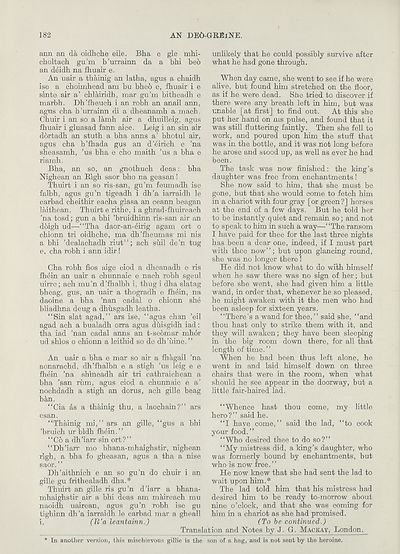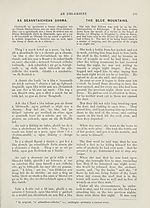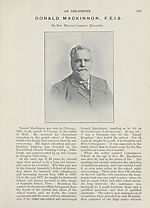An Comunn Gàidhealach Publications > Deo-gréine > Volume 17, October 1921 to September 1922
(190) Page 182
Download files
Complete book:
Individual page:
Thumbnail gallery: Grid view | List view

182
AN DEO-GRElNE.
ann an da oidhche eile. Bha e gle mhi-
choltach gu’m b’urrainn da a bhi bed
an ddidh na fbuair e.
An uair a thainig an latha, agus a chaidh
ise a choimhead am bu bhed e, fhuair i e
slnte air a’ chlairidh, mar gu’m bitheadh e
marbh. Dh’fheucb i an robh an anail ann,
agus cha b’urrainn di a dheanamb a mach.
Chuir i an so a lamb air a dhuilleig, agus
fhuair i gluasad fann aice. Leig i an sin air
dbrtadh an stuth a bha anns a’ bbotul air,
agus cha b’fhada gus an d’dirich e ’na
sheasamh, ’us bha e cho maith ’us a bha e
riamh.
Bha, an so, an gnothuch deas: bha
Nighean an Bigh saor bho na geasan!
Thuirt i an so ris-san, gu’m feumadh ise
falbh, agus gu’n tigeadh i dh’a iarraidh le
carbad cheithir eacha glasa an ceann beagan
huthean. Thuirt e rithe, i a ghrad-fhuireach
’na tosd; gun a bhi ’bruidhinn ris-san air an
dbigh ud—“Tha daor-an-dirig agam ort o
chionn tri oidhche, ma dh’fheumas mi nis
a bhi ’dealachadh riut”; ach siiil de’n tug
e, cha robh i ann idir!
Cha robh fios aige ciod a dheanadh e ris
fhdin an uair a chunnaic e nach robh sgeul
uirre; ach mu’n d’fhalbh i, thug i dha slatag
bheag, gus, an uair a thogradh e fhdin, na
daoine a bha ’nan cadal o chionn she
bliadhna deug a dhiisgadh leatha.
“Sin slat agad,’’ ars ise, “agus chan ’eil
agad ach a bualadh orra agus duisgidh iad:
tha iad ’nan cadal anns an t-seomar mhor
ud shlos o chionn a leithid so de dh’uine. ”
An uair a bha e mar so air a fh&gail ’na
aonarachd, dh’fhalbh e a stigh ’us leig e e
fhdin ’na shlneadh air tri cathraichean a
bha ’san riim, agus ciod a chunnaic e a’
nochdadh a stigh an dorus, ach gille beag
b£m.
“Cia &s a th&inig thu, a laochain?” ars
esan.
“Thainig mi,’’ars an gille, “gus a bhi
’bruich ur bldh fh^in.”
“C6 a dh’iarr sin ort?’’
“Dh’iarr mo bhana-mhaighstir, nighean
righ, a bha fo gheasan, agus a tha a nise
saor. ’ ’
Dh’aithnich e an so gu’n do chuir i an
gille gu frithealadh dha.*
Thuirt an gille ris gu’n d’iarr a bhana-
mhaighstir air a bhi deas am mkireach mu
naoidh uairean, agus gu’n robh ise gu
tighinn dh’a iarraidh le carbad mar a gheall
i. (R’a leantainn.)
unlikely that he could possibly survive after
what he had gone through.
When day came, she went to see if he were
alive, but found him stretched on the floor,
as if he were dead. She tried to discover if
there were any breath left in him, but was
unable [at first] to find out. At this she
put her hand on ms pulse, and found that it
was still fluttering faintly. Then she fell to
work, and poured upon him the stuff that
was in the bottle, and it was not long before
he arose and stood up, as well as ever he had
been.
The task was now finished: the king’s
daughter was free from enchantments!
She now said to him, that she must be
gone, but that she would come to fetch him
in a chariot with four gray [or green?] horses
at the end of a few days. But he told her
to be instantly quiet and remain so; and not
to speak to him in such a way—“The ransom
I have paid for thee for the last three nights
has been a dear one, indeed, if I must part
with thee now”; but upon glancing round,
she was no longer there!
He did not know what to do with himself
when he saw there was no sign of her; but
before she went, she had given him a little
wand, in order that, whenever he so pleased,
he might awaken with it the men who had
been asleep for sixteen years.
“There’s a wand for thee, ” said she, “and
thou hast only to strike them with it, and
they will awaken; they have been sleeping
in the big room down there, for all that
length of time.”
When he had been thus left alone, he
went in and laid himself down on three
chairs that were in the room, when what
should he see appear in the doorway, but a
little fair-haired lad.
“Whence hast thou come, my little
hero?” said he.
“I have come,” said the lad, “to cook
your food.”
“Who desired thee to do so?”
“My mistress did, a king’s daughter, who
was formerly bound by enchantments, but
who is now free. ”
He now knew that she had sent the lad to
wait upon him.*
The lad told him that his mistress had
desired him to be ready to-morrow about
nine o’clock, and that she was coming for
him in a chariot as she had promised.
(To be continued.)
non and Notes by J. G. Mackay, London.
* In another version, this mischievous gillie is the son of a hag, and is not sent by the heroine.
AN DEO-GRElNE.
ann an da oidhche eile. Bha e gle mhi-
choltach gu’m b’urrainn da a bhi bed
an ddidh na fbuair e.
An uair a thainig an latha, agus a chaidh
ise a choimhead am bu bhed e, fhuair i e
slnte air a’ chlairidh, mar gu’m bitheadh e
marbh. Dh’fheucb i an robh an anail ann,
agus cha b’urrainn di a dheanamb a mach.
Chuir i an so a lamb air a dhuilleig, agus
fhuair i gluasad fann aice. Leig i an sin air
dbrtadh an stuth a bha anns a’ bbotul air,
agus cha b’fhada gus an d’dirich e ’na
sheasamh, ’us bha e cho maith ’us a bha e
riamh.
Bha, an so, an gnothuch deas: bha
Nighean an Bigh saor bho na geasan!
Thuirt i an so ris-san, gu’m feumadh ise
falbh, agus gu’n tigeadh i dh’a iarraidh le
carbad cheithir eacha glasa an ceann beagan
huthean. Thuirt e rithe, i a ghrad-fhuireach
’na tosd; gun a bhi ’bruidhinn ris-san air an
dbigh ud—“Tha daor-an-dirig agam ort o
chionn tri oidhche, ma dh’fheumas mi nis
a bhi ’dealachadh riut”; ach siiil de’n tug
e, cha robh i ann idir!
Cha robh fios aige ciod a dheanadh e ris
fhdin an uair a chunnaic e nach robh sgeul
uirre; ach mu’n d’fhalbh i, thug i dha slatag
bheag, gus, an uair a thogradh e fhdin, na
daoine a bha ’nan cadal o chionn she
bliadhna deug a dhiisgadh leatha.
“Sin slat agad,’’ ars ise, “agus chan ’eil
agad ach a bualadh orra agus duisgidh iad:
tha iad ’nan cadal anns an t-seomar mhor
ud shlos o chionn a leithid so de dh’uine. ”
An uair a bha e mar so air a fh&gail ’na
aonarachd, dh’fhalbh e a stigh ’us leig e e
fhdin ’na shlneadh air tri cathraichean a
bha ’san riim, agus ciod a chunnaic e a’
nochdadh a stigh an dorus, ach gille beag
b£m.
“Cia &s a th&inig thu, a laochain?” ars
esan.
“Thainig mi,’’ars an gille, “gus a bhi
’bruich ur bldh fh^in.”
“C6 a dh’iarr sin ort?’’
“Dh’iarr mo bhana-mhaighstir, nighean
righ, a bha fo gheasan, agus a tha a nise
saor. ’ ’
Dh’aithnich e an so gu’n do chuir i an
gille gu frithealadh dha.*
Thuirt an gille ris gu’n d’iarr a bhana-
mhaighstir air a bhi deas am mkireach mu
naoidh uairean, agus gu’n robh ise gu
tighinn dh’a iarraidh le carbad mar a gheall
i. (R’a leantainn.)
unlikely that he could possibly survive after
what he had gone through.
When day came, she went to see if he were
alive, but found him stretched on the floor,
as if he were dead. She tried to discover if
there were any breath left in him, but was
unable [at first] to find out. At this she
put her hand on ms pulse, and found that it
was still fluttering faintly. Then she fell to
work, and poured upon him the stuff that
was in the bottle, and it was not long before
he arose and stood up, as well as ever he had
been.
The task was now finished: the king’s
daughter was free from enchantments!
She now said to him, that she must be
gone, but that she would come to fetch him
in a chariot with four gray [or green?] horses
at the end of a few days. But he told her
to be instantly quiet and remain so; and not
to speak to him in such a way—“The ransom
I have paid for thee for the last three nights
has been a dear one, indeed, if I must part
with thee now”; but upon glancing round,
she was no longer there!
He did not know what to do with himself
when he saw there was no sign of her; but
before she went, she had given him a little
wand, in order that, whenever he so pleased,
he might awaken with it the men who had
been asleep for sixteen years.
“There’s a wand for thee, ” said she, “and
thou hast only to strike them with it, and
they will awaken; they have been sleeping
in the big room down there, for all that
length of time.”
When he had been thus left alone, he
went in and laid himself down on three
chairs that were in the room, when what
should he see appear in the doorway, but a
little fair-haired lad.
“Whence hast thou come, my little
hero?” said he.
“I have come,” said the lad, “to cook
your food.”
“Who desired thee to do so?”
“My mistress did, a king’s daughter, who
was formerly bound by enchantments, but
who is now free. ”
He now knew that she had sent the lad to
wait upon him.*
The lad told him that his mistress had
desired him to be ready to-morrow about
nine o’clock, and that she was coming for
him in a chariot as she had promised.
(To be continued.)
non and Notes by J. G. Mackay, London.
* In another version, this mischievous gillie is the son of a hag, and is not sent by the heroine.
Set display mode to:
![]() Universal Viewer |
Universal Viewer | ![]() Mirador |
Large image | Transcription
Mirador |
Large image | Transcription
| An Comunn Gàidhealach > An Comunn Gàidhealach Publications > Deo-gréine > Volume 17, October 1921 to September 1922 > (190) Page 182 |
|---|
| Permanent URL | https://digital.nls.uk/127172253 |
|---|
| Description | Leabhar 17, Treasamh Mios an Fhoghair 1921 gu Dara Mìos an Fhoghair 1922 |
|---|---|
| Attribution and copyright: |
|
| Description | This contains items published by An Comunn, which are not specifically Mòd-related. It includes journals, annual reports and corporate documents, policy statements, educational resources and published plays and literature. It is arranged alphabetically by title. |
|---|
| Description | A collection of over 400 items published by An Comunn Gàidhealach, the organisation which promotes Gaelic language and culture and organises the Royal National Mòd. Dating from 1891 up to the present day, the collection includes journals and newspapers, annual reports, educational materials, national Mòd programmes, published Mòd literature and music. |
|---|---|
| Additional NLS resources: |
|

